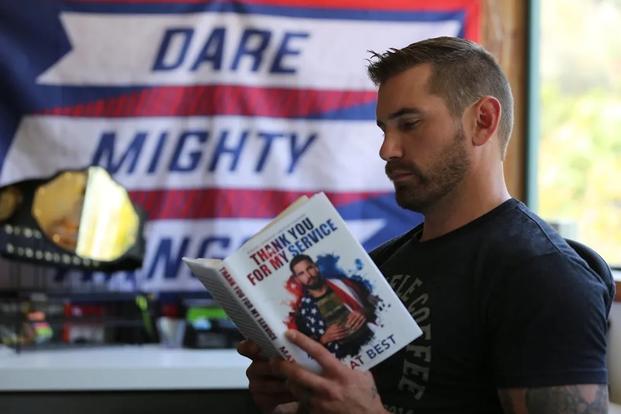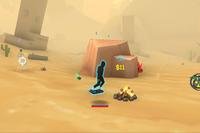My first impression is that Mat Best is the kind of guy you want to party with. Or at the very least take a shot with. Whether it's bikini snaps, whiskey or coffee, you can tell within seconds of meeting Mat that he is all about living life to the fullest. For real.
The former Ranger turned contractor is the internet icon behind Article 15 clothing, Leadslingers Whiskey, and most recently Black Rifle Coffee Company. But that's just the beginning of Mat's second act. He's walking into the WATM office as the author of his newly released memoir, “Thank You For My Service,” and he has something powerful to say to us all…(spoiler alert).
For the first time, Mat's taken down some walls and opened himself up in his book in a way that even his business partners have never seen. He's honest. He's vulnerable, and even better he's embraced the awkward. Especially when it comes to the most cliché statement in the history of veterans, "Thank you for your service." A statement that has been awkward and fallen flat to so many veterans is now Mat's source of strength.
As we mic up for the interview, I am just beginning to realize that my initial impressions don't even scratch the surface of Mat's world. This is man and warrior who has garnered billions of views across the internet with his hilarious videos, yet, his humour is the tool that has lifted him from tragedy. This is a very different Mat than we have seen on Youtube or Instagram and for damn sure I am going to listen to what he has to say.

WATM: Can you give us a brief intro about you?
Mat Best: My name is Mat Best. I am an internet influencer. I hate that, just kidding. My name is Mat Best, and I'm the co-founder of Black Rifle Coffee.
WATM: Are you a Navy Seal?
Mat Best: I am not a Navy Seal, although I am taking tips from their hairstylists.
WATM: So if you're not a Navy Seal, why'd you write a book?
Mat Best: I thought we have to get the message out about the amazing individuals of the 75th Ranger Regiment, which is where I came from and grew up. So that's the story I wanted to tell.
WATM: I love it. All right, Good.
Mat Best: You were happy with that one. He was like, "I gotta hit the Navy Seal jokes."
WATM: I didn't even write that joke but yes, it makes me happy. Ok, let's go back to when you're in the Army. What kind of soldier would you say you were?
Mat Best: I would say that I was the team room jokester, but then took my job very serious, and I would like to think of myself as an absolute professional while I'm doing my job.
WATM: Is there anything you've learned, especially being in the Ranger Regiment, that's helped you in business and now writing a book?
Mat Best: Absolutely. I think being in the military, specifically the Ranger Regiment, you consistently solve complex problems. It's you and your buddies on the ground and you're presented with all these crazy situations, and you can't ask for help. It's up to you and the team to execute and follow through with the mission plan. And I think that is so attributable to business, because no one tells you what to do, what the right answer is. You're just in a gunfight, and you got to fix it. And sometimes it's ugly. And so, all those lessons learned in the military directly apply to business. And that's why at Black Rifle, we try to hire so many veterans, because they come from such a diverse background, that they have so many applicable skills that a lot of civilians don't have.
WATM: What do you think makes Black Rifle Coffee Company special compared to other companies?
Mat Best: Mainly, I would say what makes Black Rifle Coffee so special is our mission statement and our values. We're very transparent with what we put out there, and we always say, "Vote with your dollar." And I think it's refreshing in American culture to know who you're supporting when you purchase a good, and not only a good, but a very high quality good. So that's what we take pride in. When you buy Black Rifle Coffee, you know what our mission statement is, and you know what we're going to do.
WATM: Was there anything specifically from your time in uniform that transformed you into who you are today?
Mat Best: I've had a few tragedies with friends while deployed, and honestly, it just really gave me this profound perspective on life. That it's insanely short, you never know when it's going to end, and that only supported my goal to make people laugh, humor through horror. We have one shot at this life, there's no dress rehearsal, let's just live it to its fullest. And it's okay to enjoy life. Have fun, laugh. We don't know how long we're going to be here. And so those experiences really helped develop me to who I am today, to not really sweat the small stuff. Let's focus on the big stuff, health, well-being, and all that.
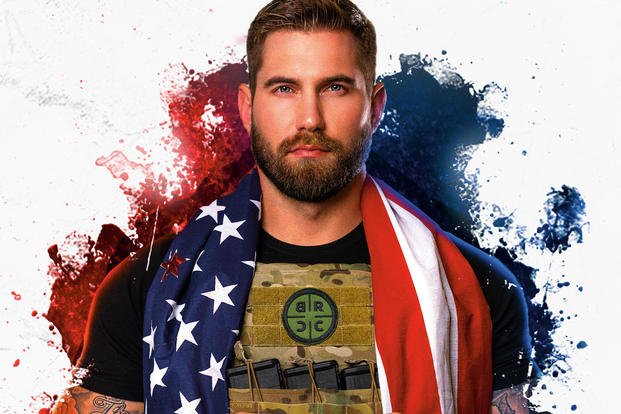
WATM: Did you ever get an article 15?
Mat Best: No. That's why I laugh. People will say, "You started a company called Article 15 Clothing." I've got a good conduct medal, man.
WATM: What did that transition look like for you?
Mat Best: Yeah, mainly when I got off active duty, I moved here to Los Angeles, and I had absolutely no clue what I was going to do. I went through a pretty deep and heavy transition and learned a lot about myself, what I wanted to do. Kind of regaining that sense of purpose and what I wanted to devote my life to, which subsequently made me be a contractor, because I really missed the team mentality and the brotherhood. For a while, I thought I really missed war, but what I really missed was the camaraderie and the brotherhood that was enveloped in that experience. And so, once I became a contractor, that made it very clear in my mind that this is what I want to do. I want to live in this community, and I want to provide value in this community.
WATM: How did you decide to go down this route of entrepreneurship, especially on video content and being an influencer?
Mat Best: I needed an outlet creatively. So I just started making YouTube videos to make five people laugh, and five turned to a thousand, a thousand turned to 100,000 and it kind of snowballed effect. And what I realized is that there was such a want and need for that style of content that hadn't been done before. And it's pretty cool to see a lot of other influencers in the military making people laugh, doing callback jokes to basic training, just creating that military experience so we can not relive it, but have those fond memories of service post-service.
WATM: What do you think about the term 'influencer?'
Mat Best: I think 'influencer' applies to certain people. I think influence means you have influence, you're not just famous for posting a likable photo. And I think people are finding that out on Instagram, where they have followers, and they have certain engagement metrics, but they're not able to influence a message or a culture or something like that. It's a tricky term. Overused.
WATM: What do you feel when somebody says, "Hey Mat, thank you for your service?"
Mat Best: It's a challenging question when people say, "Thank you for your service," I think there is a sense of empathy and appreciation in the statement, but I think civilian culture has been so conditioned just to say that. Everybody wants to support veterans until it's time to support veterans. I think a basic statement of, "Thank you for your service," isn't enough. Let's go work on treatment of individuals that have moral grief and transition issues. Let's actually impact people rather than just say that. And again, that's my personal opinion. There are a lot of people out there that really appreciate that statement, but that's why I named my book. "Thank You for My Service," because I really, really appreciated being part of the community I was in special operations and doing the job. I mean, taxpayers let me go jump out of planes and fast rope out of helicopters. How cool is that?
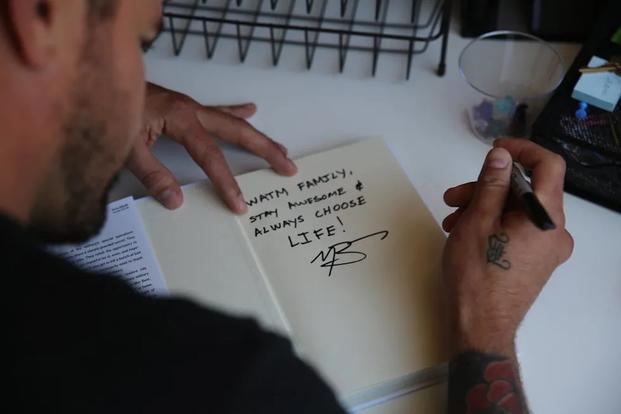
WATM: So let's get into the book, 'Thank You For My Service.' Why should we 'thank YOU for your service?'
Mat Best: We shouldn't thank me for my service. I want to thank you for your service and my service. No, I thought it was a funny play. Some people read it immediately and go, "Whoa, that's super douchey." And they go, "Oh, I get it. What he's trying to say there." So it was a play on that whole societal thing of people don't know if they should thank veterans for their service. And most importantly, what an amazing experience for me to grow up. I would never even be close to the man I am today if I didn't serve in such an amazing unit, like 75th ranger regiment. So I'm just proud of it, and I want to share that experience that I'm not a victim. It made me a better individual, even with all the stuff I saw. So I want to be a good steward of that community, and hopefully influence people to serve their country, serve their communities, and know that's a powerful thing.
WATM: So is writing a book. Congrats man, that is a huge step and powerful.
Mat Best: Thank you. And it's not in crayon. My book's not in crayon, guys. This is a big moment.
WATM: Obviously, you put a lot of time into doing this.
Mat Best: I don't think I ever really set out to write a book. It was never a part of that. I had not journal entries, but I guess you could say that I documented some of the worst times in my life, because I didn't ever want to forget how crappy it felt. And so whenever I'm feeling down, I can look back at transitioning out of the military. I can look back at losing friends and being like, "This is why I'm here. This is what's going to motivate me. Get off your suck. Wake up, let's go f*cking work." And so it really just transcribed into me talking to people, having influence, and people said, "I want to know Mat's whole story." And really for me, the only way to tell my entire story is to put it on paper. I mean you can do videos, you can chat about it, but a lot of people just see the extension of my personality through the entertainment and the skits that I do, which I fully enjoy. But that's a singular perspective on my personality. So, kind of wanted to put it all in there, make people laugh, write something that no one else has ever seen in their life before, because it's a completely different book than an average military book, that's for sure.
WATM: In the book, you talk about how you've used humor as a way to get through some very tough points in your life. Are there specific instances in the book that [were] very powerful for you?
Mat Best: Yeah, I think that's a loaded question, but it's a good one. I think there's certain aspects and stories in the book that you'll see where humor, I applied humor in a very dark situation, where people were just trying to kill us, and now we're cleaning up the aftermath, and you can tell people are a little shook up and rattled. So I just used humor to kind of offset that, get their head in the game, realize we're here for a mission. This is really messed up. Because when do you expect ever to, as an individual, to just see people blowing up and body parts flying and shooting people? No one sets you up for that experience until it happens. You've got to combat it with humor a little bit. Still being a professional, obviously, but easing the moment, I would say.
WATM: Was there ever a moment you looked at the book and said, "I can't believe I'm writing this right now?"
Mat Best: There were multiple times in the book, absolutely, where it was very challenging for me to relive a few things and I got kind of caught up and almost definitely pretty much cried a few times where I'm like, "I'll set that down." And there was definitely other times in the book where I had to go get a shot of whiskey or a glass of wine because I'm like, "I don't want to be that open about this, you know? And I'm like, "But that's how I make a good book. I have to be honest and transparent and show my struggles and my successes, because that's what's going to influence people to live their own quality of life." If I just write this top level crap book that's like, "Look at me, I served the country, I'm awesome. I do business," what value does that bring?
WATM: We don't want to give it all away. But do you think there's something that maybe the audience doesn't know that they're going to find in this book?
Mat Best: For sure. Yeah. I put a lot in this book that no one's ever known. To quote Evan Hafer, my business partner at Black Rifle Coffee, he said, "I didn't want to read your book. I didn't want to read it." And I'm like, "Well, thanks for being honest, man." He's like, "Well, I've known you for six-plus years. I know your stories." And then when he finally read it, he went, "Dude, I couldn't put it down. It was so interesting, and I got to a see side of my friend I didn't even know."
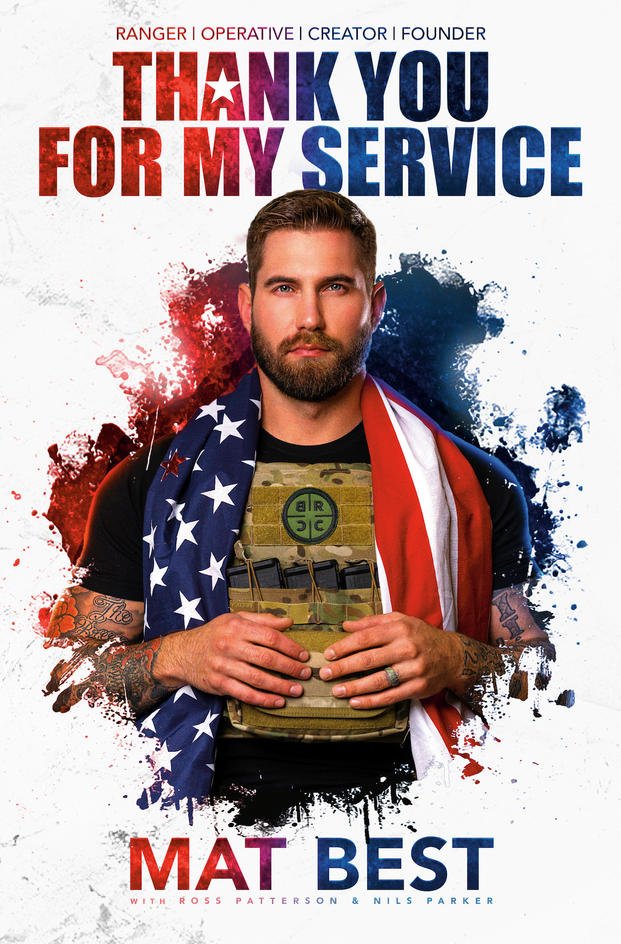
WATM: Would you say you're fully transitioned out? Do you feel like you're a civilian at this point, or is there always going to be a part of you that's related to the military?
Mat Best: At least now in the workings of Black Rifle, I'll always be part of the military for sure. To say that I don't go look back at old photos or old experiences and miss it and for some reason still wish I was deployed fighting a war when I have a beautiful wife and a successful business, it's still in there. So it's always there, and I'll always be a part of the community for sure, because I just want to see it be successful.
WATM: You offer a lot, especially to veterans out there, but not always just the veterans. Is there any advice or things that you would love your followers or people that read the book to know that you really live by?
Mat Best: Yeah, I would say as far as the transition piece, it'd be proper planning prevents piss poor performance. You have to have a mission plan going into anything. It's just like when you're going to the grocery store, and you have kids, all right, I need the car seat. You're planning, you're in that planning phase. And I think what I didn't do when I got out, I didn't plan for anything. I'm like, "I'll figure it out," in my absolute stubborn ways. And that set me up for a nosedive. And so going forward, I've always tried to plan, plan for the worst, expect the best, kind of thing. I know I'm just saying catchphrases, but they actually are applicable if you follow them. I mean, anybody can read a Pinterest quote, right? But if you live it, that's a different story.
Learn more about Mat and his journey in his new book, “Thank You For My Service.”
